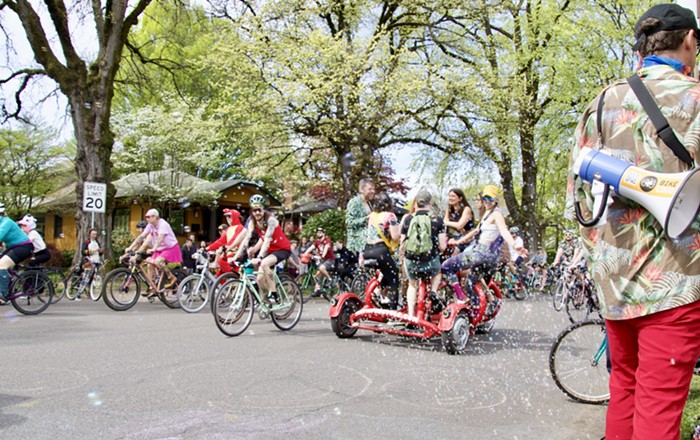
- Puget Sound Bike Share
- Seattle's bike share future is almost garishly bright.
Last summer, a rumor emerged that Portland had found its long-sought bike share sponsor in health care giant Kaiser Permanente. There was talk of "Kaiser Bikes" populating docking stations throughout the center city, Transportation Commissioner Steve Novick spoke of "significant commitments" from an unnamed sponsor, and internal documents showed branding was in development.
But no money or agreement have been made public, and the city's bike share ambitions are now on ice until 2015. Still, sources with knowledge of the discussions have said last year's rumors weren't off-base. They tell the Mercury a sponsorship was close, but that tumultuous changes in the bike share market and unflattering press over New York's system helped chill the deal.
And Kaiser now says it's not currently considering funding Portland's bike share system—or even having the discussion.
"That's not on the horizon for us, at all," says Annie Herbert, communications manager at the health care provider. "We have approved sponsorships for the year, and bike share's not one of them."
Herbert confirms that the city—like "tons of organizations"—has approached Kaiser about sponsorship cash. She wouldn't say how far those discussions went, but she made clear there are no ongoing talks around bike share. The city has consistently declined to comment on sponsorship negotiations.
Since tapping local firm Alta Bicycle Share to implement a 750-bike system in late 2012, the most persistent difficulty has been convincing companies to pony up roughly $5.5 million to help purchase a system and run it for years. It's a problem that also plagued Seattle before the city's new mayor made a phone call that got things rolling.
And there are lingering questions about the very business model Portland has chosen for its system. American cities that have had the most success with bike share—DC is the most-touted—pay for the system with a mixture of public funds and user fees. There's an argument that bike share is a form of public transit, and transit is something cities subsidize.
On the other hand, Portland, Seattle, and New York's money-losing (though very popular) system are hoping to make it work with sponsorships and user fees alone.
Tweets may not be endorsements, but it's worth noting that both PBOT Director Leah Treat and bike share Project Manager Steve Hoyt-McBeth shared links to this Washington Post story making the case for public subsidies. (Neither responded when we asked whether Portland's system should consider using public money.)
By far, @emilymbadger provides the best analysis of @CitibikeNYC's challenges and accomplishments: http://t.co/S7PeGRyB0E @bikeshare
— Steve Hoyt-McBeth (@HoytMcBeth) April 2, 2014Getting back to Kaiser, Herbert concedes it's possible Portland will come calling again about a sponsorship. And like it does with each of the many organizations looking for financial partnerships, Herbert says Kaiser would hear the city out.
"We get approached constantly," she says. "We typically have an open door to have that conversation."













